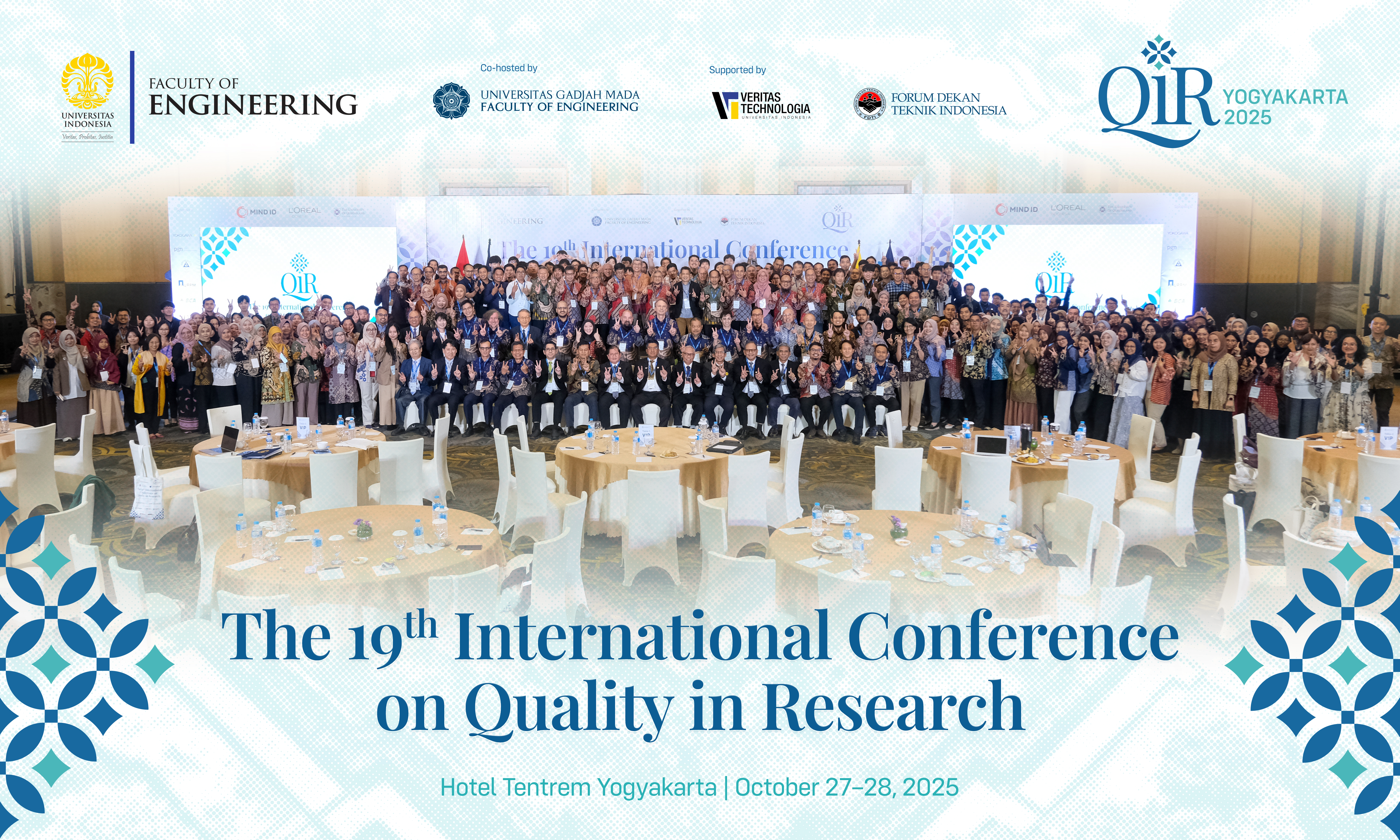The Faculty of Engineering, Universitas Indonesia (FT UI) once again strengthens its contribution to global research and technological innovation through the organization of The 19th International Conference on Quality in Research (QIR) 2025 held in Yogyakarta on Monday (27/10) and Tuesday.
Carrying the theme “Empowering Indonesia Through AI-Driven Innovation and Solutions for a Better Future”, the conference serves as a meeting ground for scientists, academics, and professionals from more than 20 countries to discuss the role of Artificial Intelligence (AI) in building a sustainable future.
More than 270 researchers presented their findings across various fields of engineering and architecture. This year, FT UI collaborated with the Faculty of Engineering, Universitas Gadjah Mada (UGM) as co-organizer, hosting a multidisciplinary forum that connects academia, industry, and policymakers.
In addition to the main conference, QIR 2025 was held in conjunction with The 10th International Symposium on Biomedical Engineering (ISBE) and The 10th Indonesia–Japan Joint Scientific Symposium (IJJSS).
Through the synergy of these three major conferences, QIR 2025 became a strategic platform to strengthen international academic and research networks, including long-term collaborations between UI and Japanese partner universities such as Chiba University and Tokyo University of Agriculture and Technology (TUAT).
In his opening remarks, UI Rector Prof. Dr. Ir. Heri Hermansyah, S.T., M.Eng., IPU, emphasized the importance of AI-based innovation in accelerating national transformation toward technological independence.
“As the largest economy in Southeast Asia, Indonesia is actively integrating artificial intelligence to strengthen infrastructure, enhance industrial productivity, and improve the quality of life. QIR represents the tangible collaboration between academia, industry, government, and society in driving inclusive and sustainable technological transformation,” explained Prof. Heri.
Meanwhile, Dean of FT UI Prof. Kemas Ridwan Kurniawan, S.T., M.Sc., Ph.D. added that QIR has long served as a global collaborative platform that brings together various engineering disciplines to create impactful innovations.
“For nearly two decades, QIR has not only been a scientific forum but also a bridge connecting academia, industry, and government. Through this year’s theme, FT UI reaffirms its commitment to strengthening interdisciplinary collaboration and harnessing the potential of AI to build a sustainable and competitive future,” said Prof. Kemas.
To enrich the scientific discourse, QIR 2025 featured three international keynote speakers, all leading experts in technology and innovation. The first was Prof. Dr. Ir. Dodi Sudiana, M.Eng. from UI, an expert in smart energy systems and AI-based sensor technology. In his presentation, Prof. Dodi emphasized the integration of AI and satellite technology to address national challenges in remote sensing. By leveraging AI-powered satellite data, Indonesia can now monitor rice fields, detect floods, and predict environmental changes with high precision. This innovation represents not only technological advancement but also a concrete contribution to national resilience and sustainable development.
The second keynote speaker, Prof. Ali Malkawi from the Harvard Graduate School of Design, Harvard University, is the founder of the Harvard Center for Green Buildings and Cities and an expert in sustainable building design. He highlighted how AI is revolutionizing the way humans design and manage buildings. Prof. Malkawi introduced the HouseZero project, a living laboratory equipped with multi-data sensors to monitor building conditions in real time. The data is then processed using AI to create adaptive, energy-efficient designs that approach the concept of net-zero buildings.
The final keynote speaker was Prof. Ong Yew Soon from Nanyang Technological University (NTU), Singapore. As an expert in AI research, computational intelligence, and autonomous systems, Prof. Ong invited participants to reflect on the ethical and humanistic dimensions of AI advancement. He explained how AI can now assist researchers in developing innovative ideas — from simple prompts to full prototypes through 3D printing technology. Yet, above all, he underscored the importance of maintaining ethics, integrity, and morality in every step of technological development.
As moderator, Prof. Muhammad Suryanegara from FT UI summarized the key message from all three speakers: that AI is not the end of human intelligence but its evolution. With a spirit of scientific optimism, researchers and engineers believe AI can become humanity’s partner in creating a better and more sustainable future.
Moreover, more than 20 invited speakers from leading global universities also shared their latest research in fields such as AI integration, sustainable materials, digital construction, biomedical innovation, and smart manufacturing. Participating institutions included The University of Tokyo, TU Delft, The University of New South Wales (UNSW) Sydney, University of London, Chiba University, University of Manchester, and National Taiwan University of Science and Technology.
QIR is FT UI’s flagship international conference, first held in 1998. Through this forum, FT UI continues to strengthen its position as a hub for research collaboration and innovation in Southeast Asia. Selected manuscripts from QIR 2025 will be published in reputable international journals and proceedings, including Frontiers in Built Environment, International Journal of Technology, Discover Applied Sciences, Key Engineering Materials, and Advances in Science and Technology.
With the spirit of engineering for humanity, QIR 2025 is expected to generate new ideas, expand global networks, and reinforce Indonesia’s contribution to leading AI-driven innovation for a better future.
***
Public Communication Office
Faculty of Engineering, Universitas Indonesia










